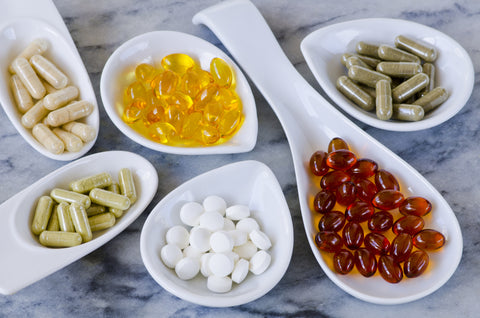Hair loss (alopecia) has reversible (telogen effluvium) and less reversible forms (permanent hair loss).
There are many different types of hair loss. One of the most common types is called male-pattern baldness and female-pattern baldness (androgenic alopecia), usually affecting the older population. Wearing your hair in a tight ponytail or bun constantly, can cause traction alopecia, which is caused by constant pulling.
Hair loss is a slow process, which causes side effects such as thinning on the crown and temples and bald spots, starting in people’s late twenties. It can be genetic, associated with extremely sensitive hair follicles and an increased level of a certain male hormones.
It is not just genetic; it is triggered by many different factors. Many health issues can cause alopecia such as thyroid disorders, autoimmune diseases, and serious illnesses.
Medication, bacterial and fungal infections, causing inflammation around the follicles may contribute to loss. Even heat styling can affect your growth and thickness.
Psychological or physical stressors, such as periods of depression, intense stress, bereavement and hormonal changes can also thin your hair, even a few months after a traumatising event.
Vitamin Deficiencies
Nutrient deficiencies (vitamins and minerals) may be a key reason causing hair loss and changes in colour and texture. People deficient in protein, iron, zinc, copper and biotin are more likely to experience alopecia.

Vitamins for Hair Growth and Thickness
Amino Acids
Amino acids are needed for protein synthesis, which encourages growth and strength. There is evidence that protein deficiencies or protein calorific malnutrition causes reduced synthesis, fragility and brittleness, leading to loss and loss of colour.
Without enough protein, the body can't replace the hairs that are shed naturally every day and it can become dry, brittle and weak.
Keratin is the main protein manufactured in skin, nail and hair cells. It has a specific fibrous filament structure. Sulphur amino acids, L-Cysteine and Methionine help synthesize keratin to help promote healthy locks, skin and nail growth.
Sulphur is vital for healthy connective tissue formation; we require it for normal growth and appearance.
Good sources of amino acids are cottage cheese, yoghurt, fish, meat, poultry, legumes, seeds, peanuts and grain products. A high-quality supplement (for your hair) should contain both amino acids mentioned above.
L-Cysteine is also a precursor of glutathione, one of the most powerful antioxidants to help fight harmful free radicals causing DNA damage and leading to premature ageing.
Protein-rich foods also provide Arginine, which is a precursor to nitrogen oxide, involved in the dilation of blood vessels and it helps improve the blood supply to the hair root which stimulates growth.
Hydrolysed Gelatine
Gelatine is sourced from hydrolysed collagen, derived from skin, bones, cartilage and connective tissues. Gelatine has a naturally high nutritious value and is rich in proteins.
Hydrolysation is a process that helps break down protein, into amino acids, which makes them easier to absorb.
B Vitamins
B vitamins are responsible for the proper formation of healthy red blood cells, which supply oxygen to different parts of the body.
B vitamins are crucial to help maintain a healthy nervous system, hormone production and healthy psychological function. Stress is another factor of loss.
It may be a good idea to supplement your diet with extra B vitamins to help with combating fatigue and anxiety, as well as promoting growth.
- Biotin (Vitamin B7) plays an important role in processing the energy we get from food. Poor metabolism of nutrients can contribute to undernourished follicle cells.
Biotin is specifically required for four essential enzymes that break down protein, fat and carbohydrates. We usually get enough biotin from bacteria living in the digestive tract, good dietary sources include egg yolk, liver, whole-grain cereal and some vegetables.
- Vitamin B5 plays a key role in maintaining flexibility, strength, shine and colour. Low Vitamin B5 levels are associated with greying. Vitamin B5 is sometimes called the "anti-stress" vitamin and is critical to the manufacture of sex and stress-related hormones produced in the adrenal glands.
Chicken, salmon, avocados and broccolis are good sources of B5.
- Vitamin B6 and Vitamin B12 help maintain a healthy hormonal balance and nervous system. Good sources of B6 and B12 are found in cereals, chicken, egg yolk, milk and liver.
Both vitamins play an important role in maintaining red blood cells, steroid hormone production and combating fatigue, stress and tiredness.
Vitamin B6 helps prevent dandruff and there is evidence that deficiency in B12 can slow your growth rate and lead to premature hair loss.
- According to an article published in Huntington College of Health Sciences in 2009, “a decrease in folic acid may contribute to decreased hair-follicle cell division and growth.
Folic acid is also essential for the maintenance of healthy methionine levels in the body. Signs of folic-acid deficiency include anaemia, apathy, fatigue, and greying.
Choline, Inositol and Para Amino Benzoic Acid (PABA)
- Paraaminobenzoic acid (PABA) has been used to stimulate growth and reduce greying, that is associated with nutrient deficiency and/or stress.” Dark leafy green vegetables, beans, seeds (folic acid/choline/PABA), wholegrains, organ meats, eggs (choline) are good sources of these nutrients.
- A reduction in papilla cells, which are responsible for the nourishment of the follicles, is seen when Dihydrotestosterone (DHT) levels in the body are high. Inositol helps lower levels of DHT.
Iron
Iron deficiency or anaemia may be one of the causes of hair loss in women. As they regularly lose iron rich blood during menstruation.
The symptoms include, hair loss, pale appearance, depression and a change of colour, to a lighter shade as well as excessive dryness.
Zinc
Zinc is found in meat, eggs and seafood but our intake is generally low. Zinc stimulates the activity of several enzymes and is therefore involved in normal cell growth as well as normal hormonal and reproductive health.
As an essential component of genetic material for DNA and RNA production, zinc helps normal follicle-cell division. Topical applications of zinc have been shown to reduce loss. The recommended dosage is 15 mg of zinc per day.
Hair-vit® contains all of the key vitamins and minerals, mentioned above. Such as B vitamins, PABA, Inositol, Iron and Zinc and many more, to protect your hair health.
Tips
- Hair masks are also useful to renourish the follicles and promote growth.
- Air drying instead of using a blow dryer is much better.
- Use a wide toothed comb and brush gently to get rid of lose hair.
- Use heat protection if you have to use heat treatments or heat styling tools.
- Wash your hair as little as possible, try for once a week.
Any information or product suggested on this website is not intended to diagnose, treat, cure or prevent any medical condition. Never disregard medical advice or delay in seeking it because of something you have read on this website. Consult your primary healthcare physician before using any supplements or making any changes to your regime.
Related Articles
- Hair Loss & Damaged Hair | HealthAid
- What Is Stress And How To Cope With It
- Health Benefits of Biotin
- Health Benefits Of Black Seed (Nigella Sativa)
Sources
- http://www.nhs.uk/conditions/Hair-loss/Pages/Introduction.aspx
- https://www.ncbi.nlm.nih.gov/pubmed/20877029
- http://aminoacidstudies.org/major-study-confirms-that-l-cysteine-can-reverse-hair-loss/#fn-2181-3
- https://www.ncbi.nlm.nih.gov/pmc/articles/PMC4828511/
- https://www.ncbi.nlm.nih.gov/pmc/articles/PMC4828511/
- Effect of gelatin-cystine on hair growth Morganti et al. (Morganti, P., Randazzo, S. and Bruno, C., J. Soc. Cosm. Chem., 1982, 33: 95-96
- Morganti, P., Fabrizi, G., James, B. & Bruno, C. 1998. Effect of gelatin-cystine and serenoa repens extract on free radicals' level and hair growth. Journal of Applied Cosmetology, 16, 57-64.
- http://lpi.oregonstate.edu/mic/vitamins/biotin
- Knowles J. The mechanism of Biotin-dependent enzymes. Annu Rev Biochem 1989; 58:195–221. - http://www.biotin.best/biotin-benefits/#sthash.gd3QsFCj.dpuf
- http://umm.edu/health/medical/altmed/supplement/vitamin-b5-pantothenic-acid
- http://www.livestrong.com/article/520848-vitamin-b6-for-hair-regrowth/
- http://www.hchs.edu/literature/Hair.pdf
- https://www.ncbi.nlm.nih.gov/pubmed/17951130
Images: Pretty face photo created by Racool_studio - www.freepik.com




